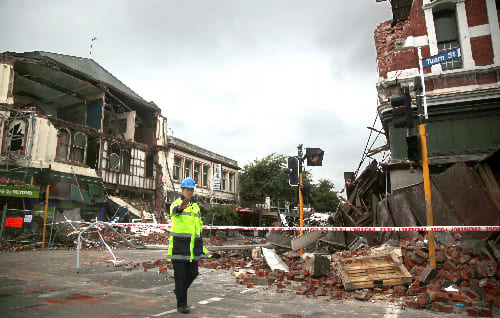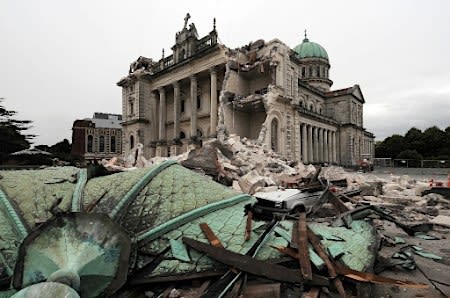2011年2月20日(日)
1月のチュニジア、2月のエジプトでの民衆蜂起による独裁者の失脚に
勢いを得て、地中海沿岸の北アフリカ諸国(いわゆるイスラム・アフリカ)
に民衆蜂起の波が広がっているようだ。
(反政府運動が広がる地中海沿岸の北アフリカ諸国 ;讀賣新聞)
 中東各地に「抗議」波及、原油輸出の中枢でも
中東各地に「抗議」波及、原油輸出の中枢でも
2011年2月20日01時41分 読売新聞
エジプト軍は節度を守り民衆に攻撃を加えなかったが、他の諸国では
武力弾圧が始まり、少なからずの犠牲者が出ているようである。
あの、カダフィ大佐が実権を握るリビアでも地方都市からデモが始まり、
首都トリポリに迫っているという。
ロイター通信によれば、武力弾圧で200 人を超える死者が出ているらしい。

(リビアの独裁者・カダフィ大佐 ;ロイター通信)
イスラム教徒が犠牲になれば、殉教者として讃えられ、反政府運動の象徴に
祀り上げられ、ますます反政府運動が力を持つことになりかねない。
そういう言わば当たり前のことを知った上で弾圧しているのだろうか?
******************
一方で中国ではインターネット回線の統制と政府による抑え込みで運動は
思うように広げられていないようである。
*******************************************

(左のアイコンをクリックして
もらえたら嬉しいです)
*******************************************
リビアのデモ死者約200人か、宗教指導者ら「同胞殺すな」 (トムソンロイター) 2011年2月20日(日)15:37
[トリポリ 20日 ロイター]
反政府デモが続くリビア第2の都市ベンガジで19日、治安部隊がデモ隊に発砲し、目撃者によると、数十人が死亡した。こうした混乱を受け、同国のイスラム教指導者らが、治安部隊に殺害を中止するよう訴える声明を発表した。
中東の衛星テレビ局アルジャジーラは先に、葬儀に参列していた市民らを治安部隊が銃撃し、少なくとも15人が死亡したと報道。人権団体は、反政府デモによる死者が過去3日で84人に上るとしていたが、20日付の英インデペンデント紙は、死者が200人に上る可能性があると伝えている。
アルジャジーラによると、デモ参加者にとらえられた治安部隊員の中には、外国人の傭兵とみられる者もいるという。同国では反政府デモが始まって以来、外国メディアの取材が制限されているほか、現地の記者らもベンガジへの移動を禁じられている。
また、携帯電話サービスも頻繁に中断しているほか、インターネットを監視する米企業は、同国内ではネットも使用できないとしている。
一方、この騒乱を受けて、リビアのイスラム教指導者約50人が、治安部隊に対して攻撃をやめるよう求める声明を発表。ロイターに寄せられた声明では「すべてのイスラム教徒は、無実の人を殺害することが創造者らによって禁じられていると認識しなければいけない。同胞を殺すな。直ちに殺りくを停止せよ」と訴えている。
あるベンガジ市民は、治安部隊は基地にとどまる一方で、多くの市民が市内の裁判所前に詰めかけており、地方政府の事務所や警察署は放火されていると証言。ANSA通信もイタリア人の目撃者の話として、現地が「完全に制御不能」になっているという。
ベンガジは、最高指導者カダフィ大佐への支持が伝統的に弱い都市とされているが、これまでのところ、同国での反政府デモが全国的に拡大するはっきりとした兆校は見られていない。
弾圧の死者180人超=首都方面にデモ拡大―リビア (時事通信) 2011年2月20日(日)20:03
【カイロ時事】
反政府デモが激化しているリビア北東部のベンガジで19日、デモ隊と治安部隊が衝突し、米CNNが複数の現地病院関係者の話として報じたところでは、97人が死亡した。犠牲者は全員、デモ参加者とみられる。国際人権団体ヒューマン・ライツ・ウオッチは先に、18日までの死者を84人としており、ベンガジなどで15日に始まった反政府デモでの死者は少なくとも181人に達した。
情報を総合すると、ベンガジでは弾圧の犠牲者の葬儀に集まった群衆に銃撃が加えられるケースが目立ち、19日には機関銃やミサイルも使われた。負傷者は1000人近くに上ったもようだ。
ベンガジやベイダなどリビアの東部は旧王制支持派の拠点で、最高指導者カダフィ大佐に反対する勢力の影響が強いが、デモは首都トリポリを抱える西部にも広がり始めた。報道によると、トリポリの東約250キロの都市ミスラタでは数千人がデモを行い、カダフィ大佐の写真が焼かれた。大佐は反政府デモに関し声明などは出していない。
一方、トリポリ在住者によれば、首都ではカダフィ大佐への支持を表明するグループが目に付く以外、普段と変わった様子はない。
ベンガジでは20日も抗議行動が行われる見通しだが、政府系のビルや銀行は焼き払われ、暴徒が破壊行為に走るなど町は無法地帯化しているもようだ。ベンガジの住民がロイター通信に語ったところでは、治安部隊は司令センターと呼ばれる市内の建物に籠城し、そこから群衆を狙い撃ちにする「虐殺」を行っているという。ただ、この住民は、市内が司令センターを除いて「解放」されたとも述べた。
[時事通信社]
中東各地で死傷者=イエメンで大規模デモ、衝突―バーレーン部隊が発砲(時事通信) - 2011年2月19日(土)02:03
中国、1000人以上拘束か…ネットでデモ予告(読売新聞) - 2011年2月20日(日)22:04
中東デモ、武力鎮圧 国民分断 流血の第2幕(産経新聞) - 2011年2月20日(日)08:00
*********************
なぜ中国人はエジプトに触発されないのか(フィナンシャル・タイムズ) - 2011年2月19日(土)22:24
Why the Chinese are not inspired by Egypt
By David Pilling
Published: February 16 2011 20:37
“Today we are all Egyptians,” Ai Weiwei, the Chinese artist, tweeted as, half a world away, Hosni Mubarak’s power structure crumbled to dust. “It took only 18 days for the collapse of a military regime which was in power for 30 years,” he wrote. China’s Communist party, he joked, had been in power for twice as long and might take that little bit longer to topple.
The sight of hundreds of thousands of people pouring into Cairo’s Tahrir Square has rekindled memories of an ill-fated, student-led occupation of another city square: Tiananmen in 1989. Lurking beneath that comparison has been an implied thought. If only Chinese people were fully aware of what their Egyptian brethren had achieved, they might be tempted to have another go.
“Some western analysts have naively bought into the notion that if you just take care of growth, people will be willing to suspend all manner of other demands,” writes Howard French, a journalist with long China experience, in The Atlantic, a US magazine. Egypt, he says, gives the lie to this presumption. “A society in its entirety, from the lowliest workers to the privileged professional class, wants a cluster of goods: economic growth, transparency, accountability, and a say in who governs it.”
That Egypt raises some awkward questions for Beijing is undeniable. That is why, particularly in the early stages of the uprising, its censors worked overtime to put a gloss on events. Official dispatches focused on the evacuation of Chinese citizens from a chaotic and dangerous Cairo, without bothering to analyse overly what had provoked such a mass disturbance.
Yet it would be wrong to conclude that Beijing lives in fear of an Egypt-inspired eruption at home. Official coverage of the past few days of the revolution was not as restricted as some western reports made out. The China Daily, the official English language newspaper, might not be entirely representative of the Chinese language media, but its front page story included a description of the “jubilation” felt by Egyptian crowds. On Sina and other mainstream websites, there was ample discussion of how food inflation – again a problem in China – was a catalyst for the uprisings in both Tahrir and Tiananmen Square.
Caixin, a business magazine founded by Hu Shuli, a standard-bearer of liberal journalism, went much further with an editorial that challenged the prevailing assumption – encouraged by the authorities – that democracies are prone to disorder. “It is autocracy that creates chaos, while democracy breeds peace,” it said. “Supporting an autocracy is in reality trading short-term interests for long-term costs.”
There are echoes of Egypt in China to be sure. But they are faint. To watch Tahrir Square from Tiananmen Square this week was to be conscious that the differences outweigh the similarities.
A population, as Mr French suggests, cannot be bought off with airports, roads and double-digit growth alone. But these things help. Despite the gross iniquities and daily injustices, China is buzzing with optimism. Most people – up to and including a 70-year-old farmer I met this week in the poor central province of Henan, turfed off his land to make way for an industrial park – say China is progressing and that life is getting better.
“We looked at what was going on in Egypt and thought: ‘What a mess’,” says Pan Xiaoli, a western-educated television presenter for the Shanghai Media Group, who says the principal concerns for the Chinese are public order, job opportunities and the chance to improve their lives.
Just as potently, there is pride in China’s growing international clout. Contrast that with Egypt, where 30 years of misrule have produced a stagnant economy and an atmosphere of national drift.
Teng Biao, a human rights activist and friend of Liu Xiaobo, the jailed winner of this year’s Nobel peace prize, says the lessons of Egypt are dulled partly by censorship and fear. But apathy and growing prosperity play their part. “Ordinary people do not really care what happens in other countries,” he says. “A lot of people are brainwashed and are not so interested in political topics.”
As Mr Teng points out, there are 80,000-90,000 “mass protests” each year. That hardly suggests an entirely contented and acquiescent people. But protesters are unlikely to rally around the idea of democracy itself and more likely to take on concrete issues related to land rights, corruption, mistrials, wages and the environment. That is partly because there is more leeway – sometimes – to protest about such matters but also because, to many, they seem more pressing.
Pan Wei, a professor of international studies at Peking University, argues that Washington has more to fear than Beijing from the Egyptian revolution. The west’s instincts are to cheer another victory for democracy, he says. But the truth is the US has lost its staunchest Arabic ally. That means Washington, desperately trying to extricate itself from a quagmire in Afghanistan and Iraq, may get sucked back into the quicksand of an uncertain Middle East. And that, implies Professor Pan, would suit Beijing just fine.
February 16 2011 20:37 david.pilling@ft.com



































